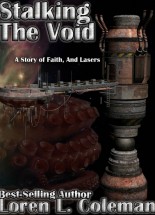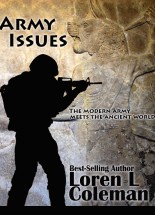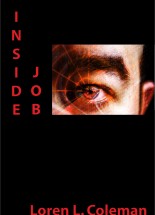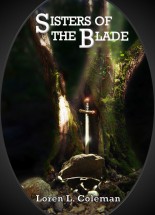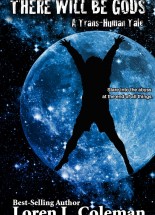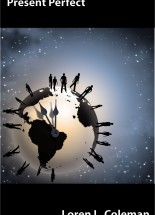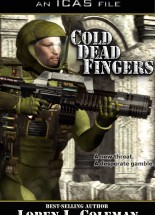Biography
The Unpublished Years
Born in Longview, Washington, 1968, Loren L. Coleman was an avid reader from a very young age. Burning through entire series and re-reading some titles six or seven times a year, this early indoctrination in storytelling served him well whenever it was necessary to blame trouble on his younger sister. It also earned him awards in several grade school and middle school contests for his creative essays and fiction vignettes (It would be a few years still before he’d truly ingrained full story structure).
Attending R.A.Long High School, Loren enrolled in a formal creative writing class taught by a teacher who would become the first of many mentors, Jim LeMonds. In Loren’s two semesters of formal class work and another three semesters writing in an “Independent Study” class, he drafted dozens of short stories, over one hundred poems and several novel outlines that are unlikely to be allowed to see the light of day ever, ever again. He also continued to write creative essays, and for his American Literature and Shakespeare classes was encouraged to write “in the style of” pieces, including adding “lost scenes” to several of Shakespeare’s plays.
He still claims these as his first “media tie-in” work-for-hire projects.
After graduation in 1986, Loren forgot he had the ability to write for any reason other than grades, and so spent several years lost only in the works of other writers. Terry Brooks, Stephen King, and Roger Zelazny would remain among his favorite authors then, and now. He enlisted in the United States Navy in 1987, accepted into the Nuclear Power Program, which challenged him academically for one of the first times in his life (meaning he was actually forced to do homework). In late 1990, assigned to the USS Theodore Roosevelt and staring bleakly into the face of a six-month deployment, Loren purchased a Smith Corona word processor (with daisy flywheel printer) and once again began writing as a method to keep himself sane. He began with a couple of science fiction short stories, then dove into a 120,000 word novel that would have been categorized as urban fantasy if the genre had truly existed yet. (More amazing than finishing such a large undertaking so early was that he survived the Gulf War cruise at all. Not that the USS Roosevelt was ever in any danger itself. But many were the threats from his shipmates for waking them after midwatch with the rather obnoxious noise of a flywheel printer.)
After his parole from the US Navy in 1993, Loren decided to forgo private sector nuclear power in favor of making a serious attempt at becoming a full-time writer. In a lifetime’s accumulation of serendipity, he was a civilian for less than two months when he tripped and fell into a writing workshop being led by Dean Wesley Smith and Kristine Kathryn Rusch, two working writers who would become lifelong friends as well as mentors.
The Published Years
A year of hard work, challenges and a swift kick to the psyche later (this last being delivered by Ms. Rusch), Loren picked up his first paying work as a freelance writer, creating a dozen creatures for a small press role-playing game supplement. This was parlayed into another year of “source work” for various hobby game titles, from which he eventually broke into a media tie-in career in early 1996 with his first professional fiction novel contract for the BattleTech novel Double-Blind.
Between 1996 and 2002, Loren wrote nine BattleTech titles as well as three other media novels and a host of short fiction, followed by the “Dark Age” period where he wrote another five MechWarrior: Dark Age novels (BattleTech, by any other name) and supporting works. During this time he was also worked for several software companies, writing dialog script and storyline support material for a half dozen popular video games. In 2004, Loren was contracted to help re-launch the Conan universe with a new Age of Conan trilogy called the Legends of Kern, which published in 2005. And although he has written (and sold) three more media novels following the Conan trilogy, only one was published, and that one under a pseudonym.
Since 2004 Loren has also been instrumental in the formation and ongoing operations of his media company, InMediaRes Productions, which has included editing work and the the writing of a great deal of short and serialized fiction. In 2007, this company expanded into a new entity, dba Catalyst Game Labs, when the intellectual properties he had formerly worked on and around (the BattleTech and Shadowrun IPs) were offered to him as their new publisher. In the last four years, Loren has been the publisher of record for over sixty game-related manuals and boxed sets and over two million words of media fiction, has edited four additional anthologies (including two for Tekno Books), and continues to develop and write for a variety of media projects.
Life After Publishing
Loren and his wife, Heather, will celebrate their twenty-second anniversary in June, 2011. They have three children: Talon (18, recently graduated, and looking for work if anyone is hiring), Conner (16, dedicated athlete working hard to get recruited for college football), and Alexia (13-going-on-18, who has learned about boys despite her father’s best efforts). Also in the house are three cats (Cleopatra, TigerLilly, and Rumor) as well as Loki, the family’s very neurotic mixed-breed border collie.
When not writing, editing, publishing, or otherwise involved in related endeavors, Loren has found time to attain a black belt in traditional Taekwon Do, plays tournament poker, oversaw the building of a new home in the Lake Stevens, Washington, area, and has become very involved in coaching youth sports (baseball, basketball, football, and was the founding president of local arena youth football). He has a passion for electronics, adores his iPhone and his iPad and very much enjoys the Kindle his wife bought him for his forty-third birthday. He and his wife enjoy hosting barbecues and formal dinners, and playing board games with family friends.
Loren still reads at voracious rates and religiously follows the works of (in no real order) Stephen King, Terry Brooks, Clive Cussler, Nora Roberts, Jeffery Deaver, Jim Butcher, Orson Scott Card, Michael Stackpole, Kristine Kathryn Rusch, Phaedra Weldon, Conn Iggulden, James Rollins, and Rick Riordan. New authors he has recently begun to follow: Taylor Anderson and B.V. Larson. He also enjoys blockbuster movies and well-written television (Castle, Burn Notice, The Big Bang Theory, and routinely repeats seven seasons of The West Wing).
But wait, there’s still more. Because writers never have enough hobbies and interests, Loren occasionally dabbles in the etymology of word phrases and iconic images (go ahead, ask him where “the whole nine yards” came from, he dares you), argues politics, collects collective nouns, memorizes poetry, and makes up paraprosdokians.
And if that isn’t enough for him, it certainly is enough from him.
